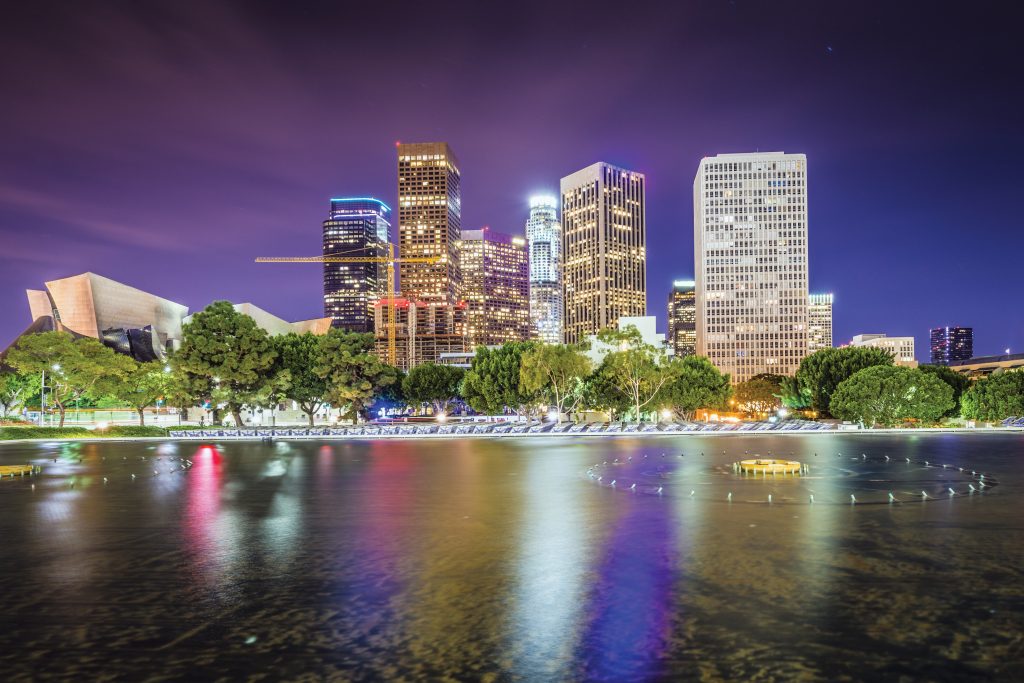David Kipen is a native Angeleno, former literature director for the National Endowment of the Arts, professor, critic, radio personality, and founder of the nonprofit Boyle Heights lending library Libros Schmibros.
But his greatest achievement may the splendid new book he compiled and edited: “Dear Los Angeles: The City In Diaries and Letters, 1542 to 2018.”
Rather than arrange the entries chronologically, Kipen hit upon a brilliant alternative: “I could start with January 1 and just work forward one day at a time, complementary trying to juxtapose a few passages for each date. One step forward, two centuries back — the perennial, quixotic spectacle of LA forever finding fresh mistakes to make.”
Thus, for any given day, you might get a padre roaming on horseback sizing up prospective mission sites, an account of meeting Greta Garbo at a cocktail party, and, say, on June 2, 1979, screenwriter Michael Palin’s evocative description of the city: “Low, flat, sprawling and laid-back — like a patient on a psychiatrist’s couch.”
The book opens, fittingly, with a passage from Judge Benjamin Hayes who on Jan. 1, 1853, wrote: “I have not yet seen a gold mine!”
The earlier entries are replete with lynchings, public hangings, slavery, drunkenness, prostitution, land grabs, and gruesome cruelty to Mexicans, Indians as they were then known, and poor people.
One throughline emerges at once: The more things change, the more they remain the same.
“[Southern Californians] never walk even the shortest distance.” — Mormon soldier Henry Standage, June 24, 1847.
“It seems that the heavens have been shut up against this people & country & the rain withheld, the earth parched & the streams dried up — caused no doubt from the wickedness of the people.” — Merchant James Gillespie Hamilton, March 31, 1858.
“Little things cannot be done in California; it must be great things or nothing.” — Ohio newspaper publisher and visitor, Harvey Rice, Nov. 10, 1869.
“Through East Los Angeles there flows what we in the East would call a brook, but here it is designated as Los Angeles River.” — Forensic psychiatrist L. Vernon Briggs, Jan. 29, 1882.
“I have never seen so many buildings going up all at once. There are thousands in process in every direction I looked.” — Pulitzer Prize-winning author/LA hater Hamlin Garland, April 19, 1923.
“If I had kept a diary of my contractor’s stupidity, no one would believe it.” — Refugee art dealer Galka Scheyer, Jan. 31, 1937.
“This part of California seems to me completely loathsome, but I like San Francisco.” — “Waspish actor and wit” Alexander Woollcott, Jan. 28, 1940.
A second throughline is that the way any given person responds to LA has more to do with the person than with LA. “It is as if you tipped the United States up so all the commonplace people slid down here into Southern California,” observed snob architect Frank Lloyd Wright on Jan. 20, 1940.
Albert Einstein, on Jan. 6, 1931, had a different take: “Here in Pasadena, it is like Paradise. Always sunshine and clear air, gardens with palms and pepper trees and friendly people who smile at one and ask for autographs.”
We learn more than we perhaps want to about the sex lives of novelist Theodore Dreiser, photographer Edward Weston, and playwright Tennessee Williams.
We’re reminded of the sorrowful undercurrents that have always flowed beneath Southern California’s vaunted “liberty”:
“We, who until war broke out, thought we would live in America for the rest of our lives, became labeled as the enemy.” — Aoki Hisa, Japanese internee, May 5, 1942.
“Some of the things that are going on made me sick … who is going to help the people?” — UFW activist Cesar Chavez, Aug. 15, 1961.
We meet William Faulkner and F. Scott Fitzgerald, both broke, homesick, and depressed while working as Hollywood screenwriters.
We learn of other wonderful, relatively unknown or forgotten writers: Valeria Belletti, secretary to Samuel Goldwyn. Charles Brackett, simultaneously obsessed with and exasperated by his writing partner Billy Wilder. Liza Williams, “sadly under-remembered, coolly neurasthenic columnist for the Los Angeles Free Press.” Urban cycling booster Aaron Paley. Eleanor Coppola (Francis Ford’s wife).
The main impression is that LA simply staggers the visitor. “[Hollywood] is an extraordinary place — absolutely mad, and really horrible … it has no relation to any other place on earth.” — British composer Benjamin Britten, Aug. 19, 1942.
“The place of virtualities, where absolutely anything might happen.” — Aldous Huxley, Nov. 8, 1937.
“Turning around, I could see the whole of the San Fernando Valley. It was all one sea of light. This is where the first space voyagers will come from.” — Critic Clive James, June 17, 1979.
In the end, the Sept. 14, 1934 summation of “Lassie” creator Eric Knight could hardly be bettered: “You wouldn’t believe that a place could be like this. The sham and the indescribable beauty.”
Yup, that’s our city — and those of us who love it seem to know that to live here is to tap daily into some unlikely cosmic jackpot.
Or as native son John Fante exclaimed, in “Ask the Dust” (1939): “Los Angeles, give me some of you!”
Heather King is a blogger, speaker and the author of several books. For more, visit heather-king.com.
SPECIAL OFFER! 44 issues of Angelus for just $9.95! Get the finest in Catholic journalism with first-rate analysis of the events and trends shaping the Church and the world, plus the practical advice from the world’s best spiritual writers on prayer and Catholic living, along with great features about Catholic life in Los Angeles. Subscribe now!

